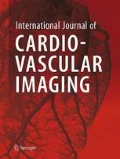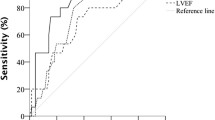Abstract
Background Late gadolinium-hyperenhancement (LHE) on cardiac Magnetic Resonance Imaging (CMR) has been linked to cardiovascular risk in ischemic and non-ischemic heart disease. We aimed to systematically categorize LHE-patterns in a variety of non-ischemic heart diseases (NIHD) and to explore their relationship with left ventricular (LV) function. Methods In a retrospective database search, 156 patients with NIHD who exhibited LHE on CMR were identified. All images were re-analyzed stepwise. LHE was correlated to LV functional parameters. Cardiac magnetic resonance (CMR) was conducted on 1.5 T scanners. Results Typically, LHE spared the subendocardium. Consistent LHE-patterns were observed in myocarditis, hypertrophic and dilated cardiomyopathy and systemic vasculitis. No conclusive LHE-patterns were observed in patients with aortic stenosis, arterial hypertension, lupus erythematosus, sarcoidosis, ventricular arrhythmia and in a mixed subgroup of rare NIHDs. There was no significant relationship between LHE and ejection fraction. There was no correlation between enddiastolic volume and LHE in either myocarditis (P = 0.13) or dilated cardiomyopathy (P = 0.62). LHE was unrelated to LV-mass in aortic stenosis (P = 0.13) and hypertrophic cardiomyopathy (P = 0.38). Conclusions Distinct LHE patterns exist in various NIHDs and their visualization may ultimately aid diagnosis. Unlike in ischemic heart disease, the structure-function relationship does not appear to be strong.



Similar content being viewed by others
References
Wagner A, Mahrholdt H, Holly TA et al (2003) Contrast-enhanced MRI and routine single photon emission computed tomography (SPECT) perfusion imaging for detection of subendocardial myocardial infarcts: an imaging study. Lancet 361:374–379
Bello D, Fieno DS, Kim RJ et al (2005) Infarct morphology identifies patients with substrate for sustained ventricular tachycardia. J Am Coll Cardiol 45:1104–1108
Abdel-Aty H, Boye P, Zagrosek A et al (2005) Diagnostic performance of cardiovascular magnetic resonance in patients with suspected acute myocarditis: comparison of different approaches. J Am Coll Cardiol 45:1815–1822
Choudhury L, Mahrholdt H, Wagner A et al (2002) Myocardial scarring in asymptomatic or mildly symptomatic patients with hypertrophic cardiomyopathy. J Am Coll Cardiol 40:2156–2164
McCrohon JA, Moon JC, Prasad SK et al (2003) Differentiation of heart failure related to dilated cardiomyopathy and coronary artery disease using gadolinium-enhanced cardiovascular magnetic resonance. Circulation 108:54–59
Mahrholdt H, Goedecke C, Wagner A et al (2004) Cardiovascular magnetic resonance assessment of human myocarditis: a comparison to histology and molecular pathology. Circulation 109:1250–1258
Assomull RG, Prasad SK, Lyne J et al (2006) Cardiovascular magnetic resonance, fibrosis, and prognosis in dilated cardiomyopathy. J Am Coll Cardiol 48:1977–1985
Nazarian S, Bluemke DA, Lardo AC et al (2005) Magnetic resonance assessment of the substrate for inducible ventricular tachycardia in nonischemic cardiomyopathy. Circulation 112:2821–2825
Gottlieb I, Macedo R, Bluemke DA, Lima JA (2006) Magnetic resonance imaging in the evaluation of non-ischemic cardiomyopathies: current applications and future perspectives. Heart Fail Rev 11:313–323
Jackson E, Bellenger N, Seddon M et al (2007) Ischaemic and non-ischaemic cardiomyopathies-cardiac MRI appearances with delayed enhancement. Clin Radiol 62:395–403
Vogel-Claussen J, Rochitte CE, Wu KC et al (2006) Delayed enhancement MR imaging: utility in myocardial assessment. Radiographics 26:795–810
Mahrholdt H, Wagner A, Judd RM et al (2005) Delayed enhancement cardiovascular magnetic resonance assessment of non-ischaemic cardiomyopathies. Eur Heart J 26:1461–1474
Richardson P, McKenna W, Bristow M et al (1996) Report of the 1995 world health organization/international society and federation of cardiology task force on the definition and classification of cardiomyopathies. Circulation 93:841–842
Cerqueira MD, Weissman NJ, Dilsizian V et al (2002) Standardized myocardial segmentation and nomenclature for tomographic imaging of the heart: a statement for healthcare professionals from the Cardiac Imaging Committee of the Council on Clinical Cardiology of the American Heart Association. Circulation 105:539–542
Carr DH, Brown J, Bydder GM et al (1984) Gadolinium-DTPA as a contrast agent in MRI: initial clinical experience in 20 patients. AJR Am J Roentgenol 143:215–224
Kim RJ, Chen EL, Lima JA, Judd RM (1996) Myocardial Gd-DTPA kinetics determine MRI contrast enhancement and reflect the extent and severity of myocardial injury after acute reperfused infarction. Circulation 94:3318–3326
Aso H, Takeda K, Ito T et al (1998) Assessment of myocardial fibrosis in cardiomyopathic hamsters with gadolinium-DTPA enhanced magnetic resonance imaging. Invest Radiol 33:22–32
Messroghli DR, Radjenovic A, Kozerke S et al (2004) Modified Look-Locker inversion recovery (MOLLI) for high-resolution T1 mapping of the heart. Magn Reson Med 52:141–146
Mahrholdt H, Wagner A, Deluigi CC et al (2006) Presentation, patterns of myocardial damage, and clinical course of viral myocarditis. Circulation 114:1581–1590
Lenghaus C, Studdert MJ (1984) Acute and chronic viral myocarditis. Acute diffuse nonsuppurative myocarditis and residual myocardial scarring following infection with canine parvovirus. Am J Pathol 115:316–319
Bultmann BD, Klingel K, Sotlar K et al (2003) Fatal parvovirus B19-associated myocarditis clinically mimicking ischemic heart disease: an endothelial cell-mediated disease. Hum Pathol 34:92–95
Magnani JW, Danik HJ, Dec GW Jr, DiSalvo TG (2006) Survival in biopsy-proven myocarditis: a long-term retrospective analysis of the histopathologic, clinical, and hemodynamic predictors. Am Heart J 151:463–470
McCarthy RE III, Boehmer JP, Hruban RH et al (2000) Long-term outcome of fulminant myocarditis as compared with acute (nonfulminant) myocarditis. N Engl J Med 342:690–695
Cooper LT Jr, Berry GJ, Shabetai R (1997) Idiopathic giant-cell myocarditis-natural history and treatment. Multicenter Giant Cell Myocarditis Study Group Investigators. N Engl J Med 336:1860–1866
Knaapen P, van Dockum WG, Bondarenko O et al (2005) Delayed contrast enhancement and perfusable tissue index in hypertrophic cardiomyopathy: comparison between cardiac MRI and PET. J Nucl Med 46:923–929
Moon JC, Mogensen J, Elliott PM et al (2005) Myocardial late gadolinium enhancement cardiovascular magnetic resonance in hypertrophic cardiomyopathy caused by mutations in troponin I. Heart 91:1036–1040
Debl K, Djavidani B, Buchner S et al (2006) Delayed hyperenhancement in magnetic resonance imaging of left ventricular hypertrophy caused by aortic stenosis and hypertrophic cardiomyopathy: visualisation of focal fibrosis. Heart 92:1447–1451
Blyth KG, Groenning BA, Martin TN et al (2005) Contrast enhanced-cardiovascular magnetic resonance imaging in patients with pulmonary hypertension. Eur Heart J 26:1993–1999
Kuribayashi T, Roberts WC (1992) Myocardial disarray at junction of ventricular septum and left and right ventricular free walls in hypertrophic cardiomyopathy. Am J Cardiol 70:1333–1340
Maehashi N, Yokota Y, Takarada A et al (1991) The role of myocarditis and myocardial fibrosis in dilated cardiomyopathy. Analysis of 28 necropsy cases. Jpn Heart J 32:1–15
Roberts WC, Siegel RJ, McManus BM (1987) Idiopathic dilated cardiomyopathy: analysis of 152 necropsy patients. Am J Cardiol 60:1340–1355
Pauschinger M, Knopf D, Petschauer S et al (1999) Dilated cardiomyopathy is associated with significant changes in collagen type I/III ratio. Circulation 99:2750–2756
Kawai S, Okada R (1990) Interstitial cell infiltrate and myocardial fibrosis in dilated cardiomyopathy: a special type of cardiomegaly corresponding to sequelae of myocarditis. Heart Vessels 5:230–236
Cothran LHE, Sandler H (1973) An analysis of left ventricular dimensional changes in conscious animals. Dewy Publication, Washington DC, pp 553–565
Petersen SE, Kardos A, Neubauer S (2005) Subendocardial and papillary muscle involvement in a patient with Churg–Strauss syndrome, detected by contrast enhanced cardiovascular magnetic resonance. Heart 91:e9
Mukherjee B, Chir B, Moon JC et al (2004) Endomyocardial fibrosis in Churg–Strauss syndrome. Clin Cardiol 27:21
Hein S, Arnon E, Kostin S et al (2003) Progression from compensated hypertrophy to failure in the pressure-overloaded human heart: structural deterioration and compensatory mechanisms. Circulation 107:984–991
Smedema JP, Snoep G, van Kroonenburgh MP et al (2005) The additional value of gadolinium-enhanced MRI to standard assessment for cardiac involvement in patients with pulmonary sarcoidosis. Chest 128:1629–1637
Knockaert DC (2007) Cardiac involvement in systemic inflammatory diseases. Eur Heart J 15:1797–1804
Acknowledgements
We would like to thank our study nurse Melanie Bochmann, as well as our technicians Kerstin Kretschel, Denise Kleindienst, Ursula Wagner, Evelyn Polzien and Franziska Neumann for their assistance.
Author information
Authors and Affiliations
Corresponding author
Additional information
Steffen Bohl and Ralf Wassmuth—contributed equally to this work.
Rights and permissions
About this article
Cite this article
Bohl, S., Wassmuth, R., Abdel-Aty, H. et al. Delayed enhancement cardiac magnetic resonance imaging reveals typical patterns of myocardial injury in patients with various forms of non-ischemic heart disease. Int J Cardiovasc Imaging 24, 597–607 (2008). https://doi.org/10.1007/s10554-008-9300-x
Received:
Accepted:
Published:
Issue Date:
DOI: https://doi.org/10.1007/s10554-008-9300-x




